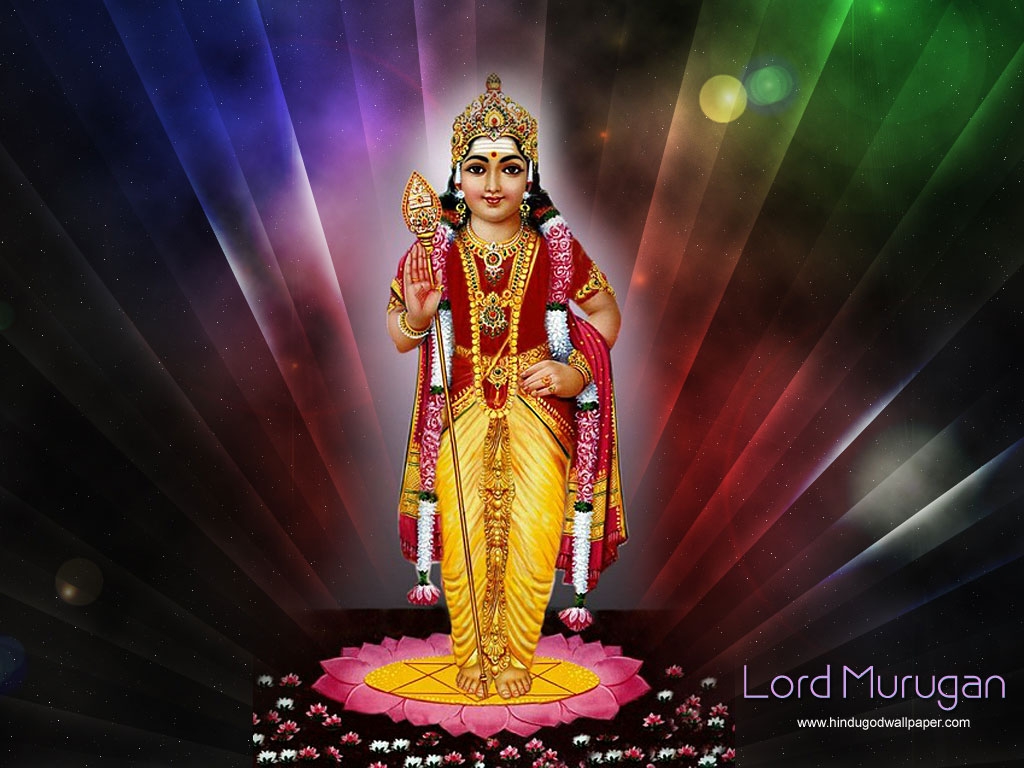
|
|||||
|
| |||||
Kandar Anubhuti: Arunagirinathar's experience of Lord Muruganby V.S. Krishnan
|
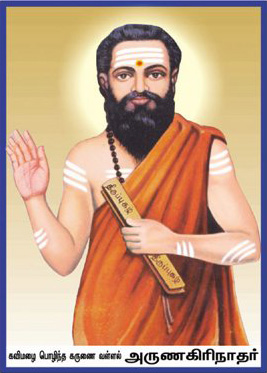 |
Arunagirinathar |
Saints and sages went through different and difficult phases in their spiritual pursuit and attained God realization at the end but Arunagirinathar experienced the presence of Muruga and attained realisation at the very beginning. It is this experience, he has explained in Kandar Anubhuti. Kandar Anubhuti is significant in another respect. While other songs of Arunagirinathar which loud the glory of Muruga, his abode, his weapon (Vel), transport (Mayil) and rooster (ensign), are objective in nature, Kandar Anubhuti, which speaks of Arunagiri's own experience is subjective.
Lord Muruga appeared before Arunagirinathar as Guru and gave the advice on the eternal truth (Upadesa on Param Porul). Arunagirinathar says that as a result of this advice, he was elevated to the state of enlightenment. “Oh Muruga, because of your grace, I went through a new experience of speechlessness." (Nesa Muruga Ninathu Anbu Arulal… Pesa Anubhuti Piranthathuve (28). We find reference to receiving the advice in another verse where he thanks the Lord for considering him fit enough to impart this rare advice. (“Aridhakiya Mei Porulukku Adiyen Urida Upadesam Unarthiyava").
One who receives the saintly advice is elevated to a state of realization. He now realizes the eternal truth. This is a divine experience. It is impossible to explain or share this experience with any one because it is an experience that he alone went through. It is strictly his own experience and cannot be transmitted to anyone. The aspirant in quest of truth should contemplate on it, find it out and experience it himself. How fortunate we are that Arunagirinathar has come forward to share his experience with us and reveal the advice he received from Muruga to us.
In his song on Arumuga temple of Kutralam, the saint poet himself says that the Lord had invited him and blessed him to sing Anubhuti so that he can share it with other devotees (Adaikkala Porulam Ena Enai Azhaithu Muthiyadham Anubhuti Ena Arut Thiruppugazh Othuka). Almost every verse of Kandar Anubhuti is the revelation of the advice which Lord Muruga had given him and this is what makes Kandar Anubhuti a great and invaluable treasure of knowledge.
Arunagirinathar has composed voluminous works on various aspects of God, the world and the human and the relation between these three aspects. Kandar Anubhuti is the crest jewel, the quintessence of all his works. It is a gateway to jnana; the way to the path of liberation. While the narration and explanation of all the 51 verses of Kandar Anubhuti would run into several pages, the author confines himself to three verses and makes an earnest attempt to understand their meaning.
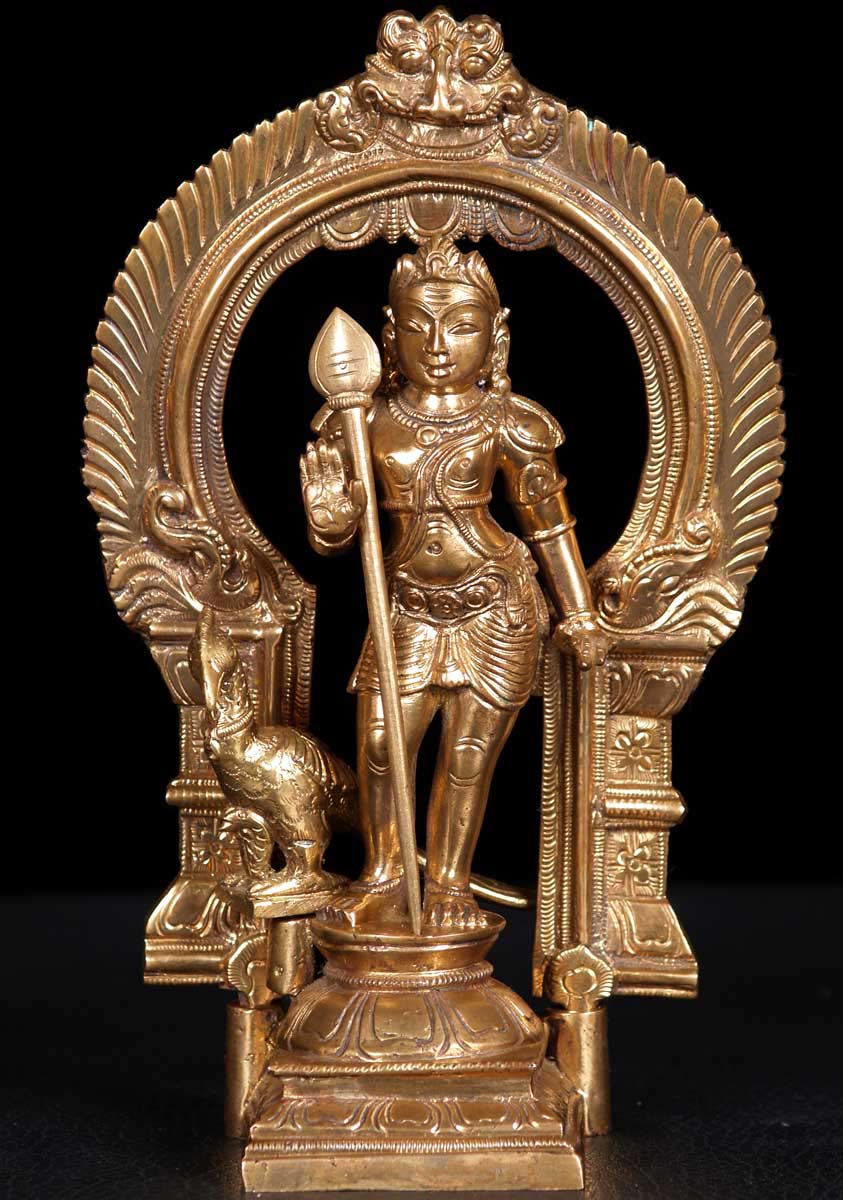
Though basically Kandar Anubhuti is a work of jnana, the opening lines of Kandar Anubhuti, underline the value of devotion. After paying obeisance to Lord Ganesa, Arunagirinathar prays that he should have such an avocation in life which enables him to sing the glory of Muruga always, His beautiful peacock, His rooster and lance. (“Padum Paniye Paniyai Arulvai.")
Semman Magalai Thirudum Thirudan
Pemman Murugan Piravan Iravan
“Summa Iru" Sollara Enralume
Amma Porul Onrum Arinthilane
Here, Valli, the tribal girl, is being referred as Semman Magal. According to legend, she was aspiring to marry Muruga even from her previous birth. Muruga finds her and concealing his identity attempts to win her heart by various means. One night, Muruga sneaks into her house and physically takes her away without the knowledge of her foster father, Nambi Rajan. Arunagirimathar describes the act as a theft and calls the Lord ‘thief'. Here, Valli represents the Atman, the Self.
Normally, the individual soul (Atman) aspires to unite with the Eternal Reality, (Paramatman) but here we find Arunagirinathar postulating a unique doctrine of Valli Sanmarga, where Paramatman himself, represented by Muruga, descends down to unite with the Atman. Arunagirinathar expresses delight and wonder at being advised by the Lord to ‘remain in silence' in order to attain the same state of union. Remaining in silence without any word being spoken (“Summa Iru, Sol Ara") is not a state of mere inactivity.
The term silence referred by Arunagirinatha Swamigal is a state, where the mind and body ceases to function and the Self, pure consciousness alone remains. It is the state where the individual remains free from worldly thoughts and free from mental activity. Observing silence, looking inward and practicing ‘Siva Yoga' paves the way for Self- realisation where the Jeevatma realises the eternal truth, Brahman. Arunagirinathar says he knows no other means to find God but the path of silence, solitude and stillness.
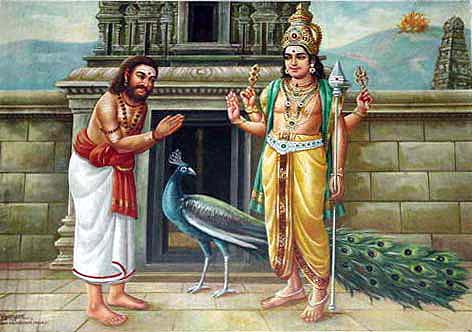 |
| Arunagiri worships Lord Murugan who had just rescued him from certain death by suicide. Painting from Tiru Avinankudi Tirukkovil, Palani. |
Aana Amudhe Ayil Vel Arase,
Jnanakarane Navila Thakumo,
Yaan Aakiye Ennai Vizhungi Verum
Thanai Nilai Ninrathu Tharparame Song No. 28
“Who are You"? If such a question is posed to one, he would say “I am Krishna" or I am the musician, the singer, the father and so on. These identifications refer to his name, his interest or his profession or his relation but not to the ‘real “I". The Self which gives him the consciousness of his existence is the real ‘I' (Thaan). But generally, the individual remains under the mistaken notion that his body, mind and intellect constitute his “I" (Yaan). Once this false notion is removed, he becomes the realized self. Arunagirinathar says: “Oh Muruga, the source of all knowledge, what a grace that I received from you! The ego that characterised my individuality has been thoroughly overpowered. You have swallowed the false “I" in me (Yaan) and as a result, what remained in me is the true “I", ever consciousness of my Self (Than). The ego-self having subsided, I am elevated to a supreme state of awareness where my real Self alone remained." In another song Thenundu Mukkanigal, Arunagiri Swamigal expresses similar concept: “Having transcended from the false notion of “I" and the world of Maya, I became enlightened and conscious of my Self. “
“Uru Anru, Aru Anru, Ulathu Anru, Ilathu Anru
Irul Anru, Oli Anru Ena Ninrathuve" (Song 13)
What is the Eternal Truth? Arunagirinathar asks in Kandar Anubhuti. (Vano Punal Paar Kanal Madudamo?) There are many images appearing before us, all appearing real and disappearing later. That which appears now and disappears later is not real. That alone is real which exists for ever. How to know the Reality with our limited power of perception? The Vedas speak eloquently about various aspects but when it comes to the question of reality, they become silent. They tell us what is not but not what is. (This is known as “Neti" “Neti", derived from the word ‘Na Iti' which means ‘not this' ‘not this' )
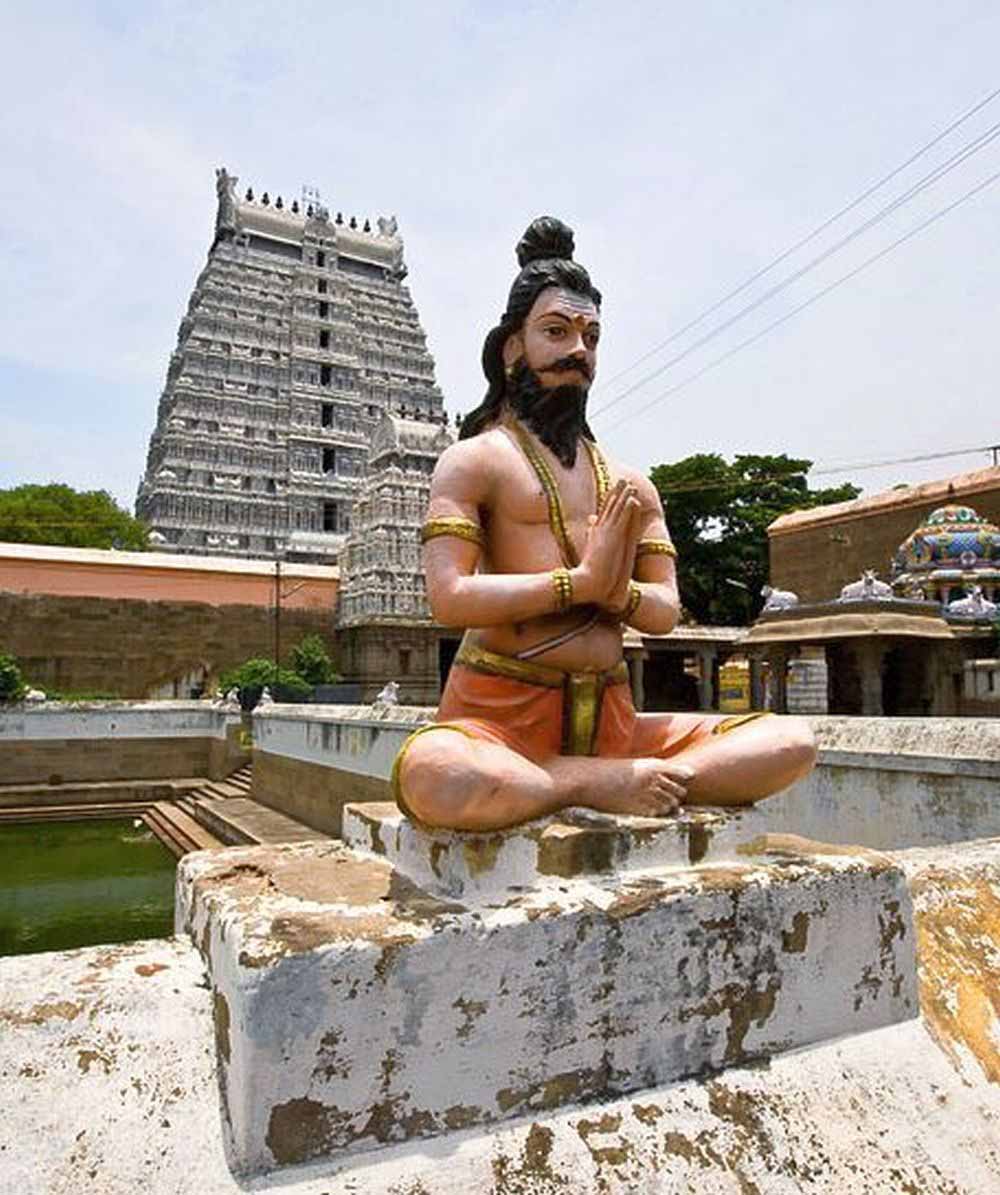
The sculpture of Sri Arunagirinathar at the temple of Arunachala, Tiruvannamalai
Bhagavan Ramana Maharshi quoted an instance. Many saints, appearing like Rama, were paraded before Sita and she was asked to identify her husband. She just shook her head before everyone, indicating ‘not this' ‘not this' till at-last, when she stood before Rama, she fell silent. Similarly, the Vedas also say ‘not this', ‘not this' and become silent when it comes to the question of eternal truth. “When all false identities are removed one by one and what alone survives, is the truth.
A spiritual aspirant starts his spiritual pursuit with an enquiry “what is" and “what is not". He pursues his mission by studying all phenomenon, subjecting every aspect to his intellectual scrutiny and removing that which his reasoning faculty does not approve. This is the process of elimination by which all that is unreal is rejected and what remains for ever is accepted as real. In his effort to find the underlying reality in Muruga, Arunagirinathar first eliminates what does not constitute Muruga. Here, Arunagirinathar describes what is not Muruga or what he is not. He has no form but He is not formless either. He is not visible to the eyes but he is not without physical features either. He is not present but he is also not absent. As he radiates light, He is not darkness but he is not Light either.
According to Sri Pamban Swamigal, one who chants Anubhuti would find himself liberated from all worldly attachments. While reciting Anubhuti, the vagaries and vicissitudes of life, the fears and anxieties of mind would disappear and the devotee would enter into the Kingdom of God where peace and tranquility prevails. Tayumanava Swamigal said: “When that day would dawn when I would experience the presence of Kandha, render the songs of Kandar Anubhuti and ever remain at his grace?" (Kandar Anubhuti Petru, Kandar Anubhuti Sonna, Enthai Arul Nadi Irukkum Nal Ennalo?).
In another song, Thayumanavar says: “Oh Muruga! Who else has rendered a verse of truth as eloquently and beautifully as you?" (Ayya Arunagiri, Unnai Pol Meyyana Or sol Vilambiyavar Yaar?"). Just as the Tenth Thirumurai, ‘Thirumantiram" composed by Thirumular is considered as the foremost epic on Siva, Kandar Anubhuti composed by Aruynagirinathar is considered as the foremost significant work on Muruga. Thanigai Ula says: “All the fifty verses of Anubhuti would transcend one to a state of infinite bliss.
As the sun dawns, let us begin the day by reciting few lines from Kandar Anubhuti and derive strength and inspiration to face the challenges of life.
Source: www.thiruppugazh.org
The Tiruppugazh Way: The Story of Guruji A.S. Raghavan
Guruji's new book: 'thalam thoRum tamizhk kadavuL'
"Saint Arunagirinathar" by A.S. Raghavan
Thiruppugazh — Musical Way of Worship
Articles about other Muruga bhaktars
|
|
